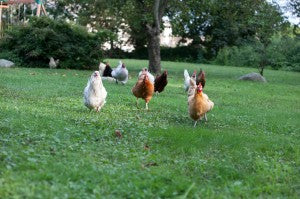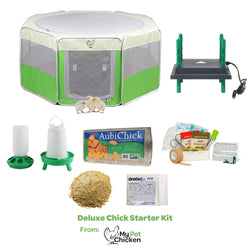Legalize Chickens DIY - Part 2
Back to blog
Last week I posted Part 1 of the "Legalize Chickens DIY" series. This is the second post in the series. If you read last week's post, by now you've done some research. You know what the laws are in your area, you know who can change those laws, and you know whether or not they already have any position on the matter. What should you do next?
Before approaching anyone with a request to legalize chickens, you should have a detailed proposal that encompasses what you envision the new regulations to allow. Again, this seems basic, but it'soften more instinctual for someone to simply call up their council member, for example, and demand the legalization of chickens in the town or area, without thinking everything through. But remember, "Make backyard chickens legal!" is not a law in an of itself, and it's fairly unlikely that a town council or board member will simply eliminate existing prohibitions without any restriction at all. The idea is to make the regulations you propose bear some resemblance to common sense. If you want to legalize chickens, you'll want to prepare a proposal outlining in detail what you envision the new code to be.
What to address in your DIY Legalize Chickens proposal:
1. How many chickens can a family keep? The number of chickens families are permitted to keep in town is often limited to a few. This is reasonable. I love chickens, but I certainly wouldn't want a neighbor who kept 500 chickens concentrated in a quarter acre yard next to my bedroom window! However, don't make the mistake of proposing too few. While it's true that three or four young Rhode Island Reds can provide a couple dozen eggs per week in season, remember that not everyone wants to keep high production breeds. Choosing the right breed is WAY important. You might want a funky-looking Polish, and they don't lay especially well. You might want green or blue egg layers that don't lay well in the winter, or hens who lay chocolate colored eggs in fewer numbers. You might want bantams who lay tiny little eggs you'll need to use more of. In other words, you want to provide enough flexibility that you don't have to be limited only to the highest production breeds. You could choose a "lap chicken," like a silkie, even though they frequently go broody and stop laying for a while. Proposing a limit of eight or 10 chickens allows some flexibility. Some towns allow a certain number based on space, such as five per quarter acre, or eight for lots less than a half acre, or a dozen for lots larger. This doesn't need to be over restricted, though. After all, is the number of cats you can keep regulated? In most cases, the answer is no.
2. Are roosters permitted in town? Roosters are usually not permitted in towns, because they crow---and not just in the morning! They crow throughout the day. I actually find the sound to be much less offensive than a barking dog, which is about the same volume. Even so, I certainly don't expect everyone to love the sound of a crowing rooster. Forcing your neighbors to listen to a crowing rooster all day is as inconsiderate as forcing them to listen to a barking dog all day. (Or a leaf-blower, which is much louder.) Most, though not all, town permitting backyard chickens restrict roosters. Some restrict roosters to certain zones, or to yards that are an acre or more in size. Those that don't have special restrictions for roosters or dogs often cover that sort of thing under general noise ordinances. My opinion is that it's not unreasonable to restrict roosters in town, but some do disagree. What do you think? If you think the general noise ordinances are enough, mention that in your proposal so you can assure your readers that you care about your neighbors' comfort and quality of life. It's important that you show how much you care about your neighbors and your community.
3. Where can my coop be located? Your chicken coop is important. Sometimes coops must be located a certain distance from property lines or dwellings. Sometimes coops must be located away from specific types of dwellings, such as hospitals or schools. Sometimes coops must be located away from property lines only if roosters are kept. If you live in town with neighbors close by, having some restrictions like these can be common sense. Other times, restrictions can be so limiting that it's next to impossible to site a coop anywhere in a small or narrow yard. Can you get any information about average lot size in the city planner's office? Can you find that out from the local zoning board?
4. Is a permit required? It's not common, but some towns require a permit to keep chickens. In some cases, the city may believe it's the best way to pay for any enforcement needed, while in other cases where the licensing is expensive, it can be a sneaky way of discouraging people from keeping chickens, or restricting backyard chickens only to wealthy people. But permit fees aren't always a bad thing. Perhaps the permit fees can go to a good cause. Can the fees be used to help fund school lunches for underprivileged children? Can they go to fund a community garden or park? What about a homeless shelter or soup kitchen? Can the fees go to support the local little league or establish a location for a farmer's market? Perhaps a permit or license is something you'll want to incorporate into your proposal. Although it's a fee you'll be paying, you may be able to win support if you show what kinds of good works people who keep chickens are interested in supporting for their communities.
5. For what purpose can chickens be kept? Generally, most towns want to specifically restrict backyard chicken keeping to non-commercial purposes, and this isn't generally a problem. Most people are not wanting to start up an egg business; they simply want chickens for pleasure, and/or to provide enough real eggs for their family. But what if you have two or three dozen extra per week to spare in the spring when your chickens are at their peak in laying? Do you want to be able to sell those to friends or colleagues? Beyond your local laws, state laws can restrict the sale of eggs--or not. In some states, you have to produce many hundreds of dozens of eggs per week before regulations apply, way more than any small flock could produce. You could consider incorporating a clause that permits the sale of up to ___ dozen eggs per week, so long as the sale of the eggs complies with other applicable regulations.
Why prepare a Legalize Chickens proposal before even speaking to your council person or board member? Simple: If you're in a large city, your council persons (or members of the health or zoning boards) are likely busy, and may not be inspired to spend the time it takes to research and draft a regulation on their own. If you're in a small town, being a member of one of these bodies is probably a part time job. Either way, they may not have the same amount of time to dedicate to the project that you do. The bottom line is that you want to make this as easy as possible for the people involved. In addition, even if you find a council person who is on board with the idea and is willing to draft something, what s/he proposes may be something that isn't nearly as good as what you design. That person may think "Four hens should be enough," without considering that not all breeds lay six or seven eggs per week, or that most hens don't lay as well during the winter or as they get older. Instead, YOU can be prepared with something that is sensible and comprehensive. When you come in prepared and professional, you'll be more persuasive. So, now are you ready to go talk to your council or board members? Not yet: there's still more preparation to do. Look for Part 3 of this series.



